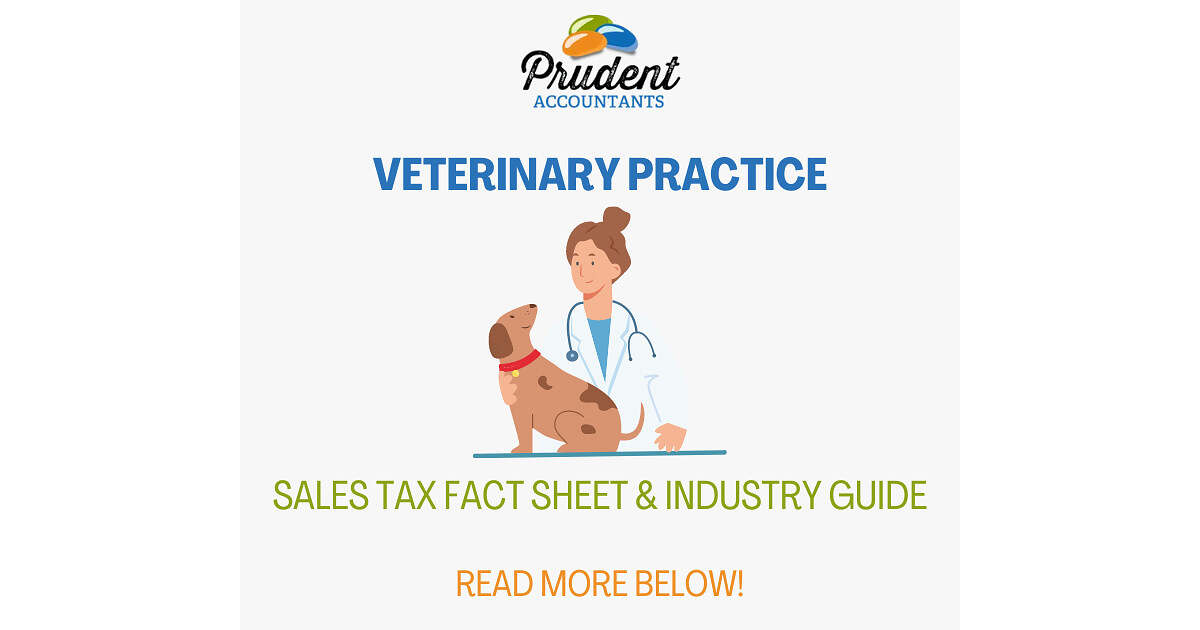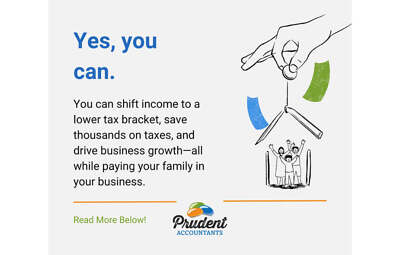Veterinary Practice – Sales Tax Fact Sheet & Industry Guide

This information describes the sales and use tax topics related to the Veterinary Practice . Use the links in the Guide Menu to see information about that topic.
Sales – Pet Animal Practice
Pet animal veterinarians specialize in the health management of pets. Pets are any animals that is tamed and kept for affection and pleasure rather than for utility or profit.
Examples of pets:
- Cats
- Dogs
- Guinea pigs
- Parrots
- Rabbits
- Turtles
Separately stated charges for veterinary services are not taxable.
Examples include:
- Administering drugs
- Exam fees
- Lab tests
- Office visits
- Surgical procedures
- Vaccinations
- X-rays
In pet practice, all drugs and supplies used to provide a service are taxable to either the veterinarian or the customer.
Examples include:
- Bandages
- Food
- Medical supplies
- Medication
- Syringes
- Prescription drugs and food
Taxable to the Veterinarian
A single charge to administer a drug or supply to a pet is not taxable. Do not charge tax on the single charge.
The veterinarian must pay tax on the cost of the drugs and supplies used in the service.
Taxable to the Customer
Separately stated charges for drugs and supplies injected, fed, or applied to the pet are taxable to the customer.
Do not pay tax when you purchase these drugs and supplies. See Nontaxable Purchases.
Sales of pet care supplies are taxable.
Examples include:
- Flea collars
- Food
- Grooming aids
- Leashes
- Medication (over the counter and prescription)
- Travel cages
- Toys
- Vitamins
Rentals of travel cages or grooming equipment are taxable.
Pet grooming services are generally taxable. However, they are not taxable when performed by a veterinarian for:
- Surgical preparation
- Treating or preventing illness or disease
For more information about pet grooming services, see the Pet and Pet Care Industry Guide.
Boarding services are generally taxable (including boarding for animal control). However, these services are not taxable when the boarding is for hospitalization, observation, or other veterinary purposes.
Note: Giving medication to a pet that is boarded for non-medical reasons is not a veterinary purpose, and the boarding service is taxable.
Microchips
The service to implant a microchip is not taxable. However, sales tax applies to the purchase of the microchip. You must do one of the following:
- Pay sales tax to your supplier when you buy the microchip.
- Buy the microchip exempt for resale and charge your customer tax when you sell it to them. (You must separately state the charge for the microchip on your invoice.)
Equipment SalesWhen you sell equipment or other items used in your business, they may be subject to sales tax. For more information, see Isolated and Occasional Sales.
Charging Sales TaxWhen you sell a taxable item, you must charge the state general sales tax and any local sales taxes that apply. Calculate tax based on the taxable sales price of the item (including any delivery charges).
Local Sales TaxSome cities and counties have local sales and use taxes. If you are located in or make sales into an area with a local tax, you may owe local sales and use tax. For more information, see Local Sales and Use Taxes.
To determine the sales tax rate, use the location where the product is received by the customer, typically your business or a delivery address. You can use our Sales Tax Rate Map or Sales Tax Rate Calculator to help you determine the sales tax rate.
Note: The map and rate calculator do not include special local taxes.
For more information, see:
Sales – Large Animal Practice
Large animal veterinarians specialize in health management of agricultural animals.
Examples of agricultural animals:
- Chickens
- Cows
- Horses
- Llamas
- Pigs
- Sheep
Agricultural animals and horses qualify for the agricultural production exemption. Items used in agricultural production are exempt. Examples include:
- Bedding
- Drugs, including pills, antibiotics, injected drugs, ointments, and vaccines
- Feeds, feed additives, vitamins, and supplements
- Hay
Consumable materials and supplies for agricultural animals that are administered, attached, or become part of the animal are not taxable. Examples include:
- Animal markers
- Antiseptics
- Bandages
- Bull rings
- Calf boluses
- Capsules
- Disposable blades, needles, and syringes
- Ear Tags
- Horseshoes
- Insecticides
- Magnets
- Nitrogen and oxygen
- OB sleeves
- Semen
- Sutures
- Tattoo ink
- Teat dilators
- Tonics
- Udder cream
For more information, see Agricultural and Farming Industry Guide.
To claim this exemption, give your supplier a completed Form ST3, Certificate of Exemption. Specify the Agricultural production exemption.
Horses
All horses, including racehorses, are exempt from sales tax.
Consumable materials and supplies for horses are exempt from sales tax.
Machinery, equipment, tools, and other durable items used to breed, raise, shoe, groom, own, board, and keep horses are taxable.
Services provided specifically for horses are exempt from sales tax. To claim the exemption, the customer must give you a completed Form ST3, Certificate of Exemption.
Examples include:
- Boarding and grooming (medical and nonmedical)
- Horse shoeing
- Trimming horse hoofs
Nontaxable Sales
Pet cremation, training services, and transportation services are not taxable.
Pet Cremation
Cremation fees are not taxable. When cremation service includes a container to transport the cremains, the charge is not taxable. The service provider owes tax on the cost of the container.
Pet urns and containers are taxable. When the cremation and urn are sold as one price, the entire charge is taxable.
Training Services
Services include obedience, tracking, or protection training.
Transportation Services
Services include picking up or delivering animals to a veterinarian.
Taxable Purchases and Use Tax
Items you use to operate your veterinary practice business are taxable, unless an exemption applies. Several services are also taxable.
If you do not pay sales tax on a taxable purchase, then use tax is due. See the table below for specific examples.
| Taxable Purchases | Examples |
| General items |
|
| Clinic supplies and equipment |
|
| Field equipment |
|
| Large animal supplies and equipment |
|
| Pet care supplies and equipment |
|
| Taxable Services |
|
Taxable items given to customers or donated to a charitable organization are taxable. You may pay tax when you buy the items or accrue use tax when you take the item out of inventory. Examples include:
- Animal treats
- Carrying boxes
- Leashes
- Rabies tag
Use tax is not due when the items given away are from a vendor as a free sample or promotional item.
Charges for developing X-rays are taxable.
If you buy equipment, supplies, or other taxable items for your business and the seller does not charge Minnesota sales tax, you owe use tax on the cost of the items. If your business is located in an area with a local tax, you may also owe local use tax.
Some common situations where you may owe use tax include:
- You buy taxable items or services online without paying sales tax
- You withdraw an item from inventory to use (instead of selling it), donate, or give away
- You buy taxable items outside of Minnesota
- You buy taxable items in another Minnesota city or county with a lower (or no) local sales tax
For more information, see Use Tax for Businesses and Local Sales and Use Taxes.
Nontaxable Purchases
Items you purchase for resale and some materials and supplies used directly to provide taxable services are exempt from sales tax.
When you buy pet care items to sell to your customers, do not pay sales tax. Give your supplier a completed Form ST3, Certificate of Exemption. Specify the Resale exemption.
Some materials and supplies used directly to provide taxable services (such as pet grooming and boarding) are exempt from sales tax.
Examples include:
- Disposable bedding
- Flea spray
- Food
- Shampoo
Give your supplier a completed Form ST3, Certificate of Exemption. Specify the Resale exemption.
Note: Durable supplies and equipment for providing grooming and boarding services are taxable. See the Pets and Pet Services Industry Guide.
Filing Returns and Record-Keeping
When filing your return, you must report all sales tax collected and use tax you owe.
When filing your return, you must report all sales tax collected and use tax you owe.
If you are not registered for sales and use tax, you must contact the Minnesota Department of Revenue and register to collect and report taxes. Call Business Registration at 651-282-5225 or 1-800-657-3605 (toll-free).
For more information, see Sales Tax Return Due Dates.
You must file a Sales and Use Tax return online through our e-Services system. For more information, see Filing Information.
It is important to keep good records to determine the correct amount of state and local tax you owe.
Your records should include:
- Bills, receipts, invoices, cash-register tapes, and any other documents that support the entries in your books
- Exemption certificates
- Shipping documents
- Worksheets used to prepare your tax returns
For more information, see the Veterinary Practice – Sales Tax Fact Sheet & Industry Guide








